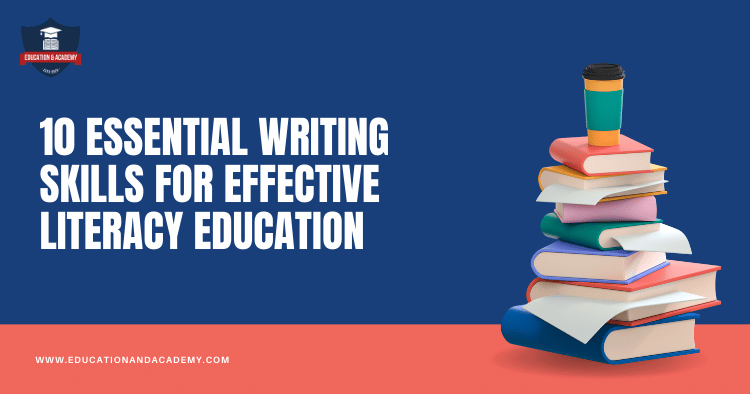- Introduction
- Understanding the Writing Process
- Mastering Grammar and Syntax
- Expanding Vocabulary
- Developing Cohesion and Coherence
- Encouraging Creativity and Originality
- Fostering Research Skills
- Teaching the Importance of Audience Awareness
- Utilizing Feedback and Revision
- Integrating Technology in Writing Education
- Conclusion
- FAQs
Introduction
Writing is a foundational skill in literacy education, serving as a gateway to effective communication and critical thinking. Whether students are crafting stories, essays, or reports, strong writing skills are vital for academic success and future opportunities. In this article, we will explore ten essential writing skills that educators can cultivate in their students to promote effective literacy education.
1. Understanding the Writing Process
Before diving into the mechanics of writing, it is crucial for students to understand the writing process itself. This process typically involves several stages: prewriting, drafting, revising, editing, and publishing.
- Prewriting: Brainstorming ideas and organizing thoughts.
- Drafting: Writing the initial version of the text.
- Revising: Making changes to improve content and structure.
- Editing: Correcting grammar, punctuation, and spelling errors.
- Publishing: Sharing the final piece with an audience.
Educators can introduce students to graphic organizers or outlines to help them visualize and plan their writing effectively. Resources such as The Writing Center at UNC offer excellent tools to aid students in understanding these stages.
“The writing process is not a linear path but a cyclical journey. Embrace the revisions as they lead to clarity and strength in your writing.”
2. Mastering Grammar and Syntax
Grammar is the backbone of effective writing. A strong grasp of grammatical rules allows students to convey their ideas clearly and accurately.
Key Areas to Focus On:
- Parts of speech (nouns, verbs, adjectives, etc.)
- Sentence structure (simple, compound, complex)
- Punctuation (commas, periods, quotation marks)
To make grammar engaging, educators can use games and interactive exercises. Resources like Grammarly’s Handbook provide comprehensive guides on grammar that are both informative and easy to understand.
“Mastering grammar is like learning the rules of a game. Once you know them, you can play with creativity and confidence.”
3. Expanding Vocabulary
A rich vocabulary enhances a student’s ability to express themselves more precisely and creatively.
Strategies for Vocabulary Development:
- Reading Widely: Encourage students to read various genres and topics.
- Word Journals: Have students maintain a journal of new words they encounter.
- Interactive Activities: Use flashcards, word games, and apps like Quizlet to make learning fun.
Building vocabulary doesn’t just improve writing; it enhances reading comprehension, making it a critical component of literacy education.
“A well-stocked vocabulary is like a toolbox; the more tools you have, the more effectively you can build your ideas.”
4. Developing Cohesion and Coherence
Cohesion refers to how well ideas flow together within a text, while coherence addresses how logically those ideas are organized.
Techniques to Teach Cohesion:
- Transitional Words: Teach students to use words like “however,” “furthermore,” and “consequently” to connect ideas.
- Paragraph Structure: Each paragraph should have a clear main idea supported by details.
Using tools like Cohesion and Coherence Worksheets can help students practice these skills effectively.
“Cohesion and coherence are the threads that weave your ideas into a tapestry of clarity.”
5. Encouraging Creativity and Originality
Writing should be an expression of the writer’s thoughts and feelings. Encouraging creativity helps students develop their voice and style.
Ways to Foster Creativity:
- Creative Writing Prompts: Use prompts to inspire stories, poems, or essays.
- Free Writing: Allow students to write without restrictions for a set period.
By providing a safe space for creative expression, educators can boost students’ confidence in their writing abilities.
“Every writer has a unique voice; nurturing creativity allows that voice to shine through.”
6. Fostering Research Skills
In an information-rich world, being able to research effectively is essential. Teaching students how to locate, evaluate, and synthesize information is crucial for producing well-informed writing.
Research Skills to Teach:
- Identifying Credible Sources: Teach students how to distinguish reliable sources from unreliable ones.
- Note-Taking Techniques: Introduce methods like the Cornell Note-Taking System to organize information.
Resources like Purdue OWL’s Research Guide can provide valuable information on effective research strategies.
“Research is the backbone of informed writing. Teach students to dig deep and discern the gold from the gravel.”
7. Teaching the Importance of Audience Awareness
Understanding the audience is key to effective writing. Students must learn to tailor their messages based on who will read their work.
Ways to Teach Audience Awareness:
- Analyzing Different Texts: Have students examine how different authors write for various audiences.
- Writing for Purpose: Encourage students to think about the purpose of their writing—whether to inform, persuade, or entertain.
Incorporating this skill into writing assignments will help students become more adaptable writers.
“Great writing resonates with its audience; awareness of who they are can transform a message from ordinary to extraordinary.”
8. Utilizing Feedback and Revision
Feedback is an essential component of the writing process. Learning to accept and apply constructive criticism helps students grow as writers.
Strategies for Effective Feedback:
- Peer Review: Organize peer review sessions where students can provide and receive feedback.
- Revision Workshops: Conduct sessions focused on revising drafts based on feedback.
Tools like Peergrade can facilitate peer feedback in a structured way, making the process smoother and more effective.
“Feedback is a gift that can illuminate paths to improvement; embrace it as part of your writing journey.”
9. Integrating Technology in Writing Education
In today’s digital age, technology plays a significant role in writing. Familiarizing students with digital tools can enhance their writing experience.
Useful Technologies:
- Writing Software: Programs like Google Docs allow for real-time collaboration.
- Blogging Platforms: Encourage students to create blogs to publish their work online.
Integrating technology not only makes writing more interactive but also prepares students for the digital landscape of communication. Additionally, exploring top 10 digital tools transforming classrooms in 2024 can provide further insights into effective integration of technology in education.
“Technology opens new doors for expression; leverage it to enhance creativity and collaboration in writing.”
10. Conclusion
Developing strong writing skills is essential for students’ academic and personal growth. By focusing on these ten essential skills, educators can create a comprehensive literacy education program that empowers students to express themselves effectively and confidently.
FAQs
1. What age should writing skills start being taught?
Writing skills can begin to be introduced as early as preschool, with foundational skills like letter formation and simple sentences. As children progress, more complex writing skills should be integrated.
2. How can I encourage reluctant writers?
Providing choices in writing topics, incorporating technology, and allowing for creative expression can help motivate reluctant writers.
3. Is it important to focus on grammar in writing education?
Yes, while creativity is important, a solid understanding of grammar and syntax is essential for clear communication.
4. What resources are available for teachers to improve writing instruction?
Many online resources, such as ReadWriteThink and Teachers Pay Teachers, offer lesson plans, activities, and materials tailored for writing education.
By nurturing these essential writing skills, educators can significantly impact their students’ literacy journeys, paving the way for successful and confident communicators in the future. To further explore related topics, consider reading about the role of education academies in modern learning or top strategies for special education in schools in 2024.






